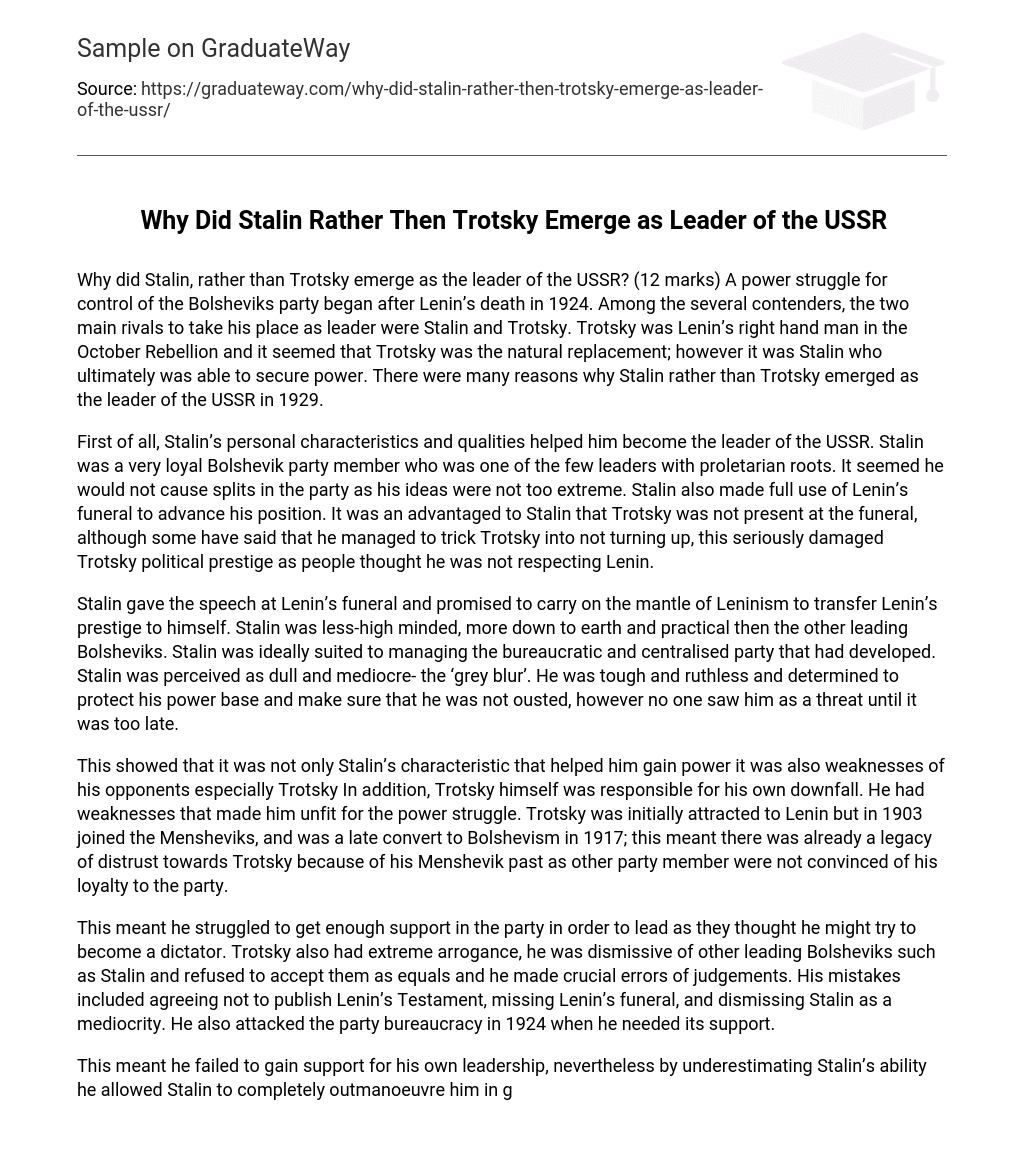Why did Stalin, rather than Trotsky emerge as the leader of the USSR? (12 marks) A power struggle for control of the Bolsheviks party began after Lenin’s death in 1924. Among the several contenders, the two main rivals to take his place as leader were Stalin and Trotsky. Trotsky was Lenin’s right hand man in the October Rebellion and it seemed that Trotsky was the natural replacement; however it was Stalin who ultimately was able to secure power. There were many reasons why Stalin rather than Trotsky emerged as the leader of the USSR in 1929.
First of all, Stalin’s personal characteristics and qualities helped him become the leader of the USSR. Stalin was a very loyal Bolshevik party member who was one of the few leaders with proletarian roots. It seemed he would not cause splits in the party as his ideas were not too extreme. Stalin also made full use of Lenin’s funeral to advance his position. It was an advantaged to Stalin that Trotsky was not present at the funeral, although some have said that he managed to trick Trotsky into not turning up, this seriously damaged Trotsky political prestige as people thought he was not respecting Lenin.
Stalin gave the speech at Lenin’s funeral and promised to carry on the mantle of Leninism to transfer Lenin’s prestige to himself. Stalin was less-high minded, more down to earth and practical then the other leading Bolsheviks. Stalin was ideally suited to managing the bureaucratic and centralised party that had developed. Stalin was perceived as dull and mediocre- the ‘grey blur’. He was tough and ruthless and determined to protect his power base and make sure that he was not ousted, however no one saw him as a threat until it was too late.
This showed that it was not only Stalin’s characteristic that helped him gain power it was also weaknesses of his opponents especially Trotsky In addition, Trotsky himself was responsible for his own downfall. He had weaknesses that made him unfit for the power struggle. Trotsky was initially attracted to Lenin but in 1903 joined the Mensheviks, and was a late convert to Bolshevism in 1917; this meant there was already a legacy of distrust towards Trotsky because of his Menshevik past as other party member were not convinced of his loyalty to the party.
This meant he struggled to get enough support in the party in order to lead as they thought he might try to become a dictator. Trotsky also had extreme arrogance, he was dismissive of other leading Bolsheviks such as Stalin and refused to accept them as equals and he made crucial errors of judgements. His mistakes included agreeing not to publish Lenin’s Testament, missing Lenin’s funeral, and dismissing Stalin as a mediocrity. He also attacked the party bureaucracy in 1924 when he needed its support.
This meant he failed to gain support for his own leadership, nevertheless by underestimating Stalin’s ability he allowed Stalin to completely outmanoeuvre him in gaining support within the Party. Stalin used Trotsky’s weaknesses such as his late coming to the party and aloofness to manipulate party members against Trotsky. Trotsky also made no real attempt to build a base of support within the party; this meant that when it came to the party in-fighting after Lenin’s death – Trotsky was at a disadvantage.
It meant that he had a difficult time in the 1920’s when confronting party congresses packed with Stalin supporters. Trotsky did not like getting involved in the ‘drudgery of politics’. He was no good at political intrigue, making alliances and trade-offs. Unlike Trotsky, Stalin was willing to play the game of politics. He was politically very skilful and cunning. Stalin stayed in the background pretending to be a moderate peacemaker. So no one realised that he was a serious power player. He outmanoeuvred his opponents, playing them off against each other.
Stalin adopted policies that were broadly approved by the majority of the Communist Party, he realised that socialism in One Country was more appealing to most party members than permanent revolution, and he used this to his advantage in party congresses. Stalin’s different positions on the NEP during the mid to late 1920s and his decisions to go for rapid industrialisation at the ends of the 1920s were supported by the majority of party members. Furthermore, Stalin also had control of the party machine through his key positions in the Politburo and Orgburo and as General Secretary.
Stalin was able to appoint his own supporters to key positions in the party. He controlled the membership of the party, using his power to expel members likely to support Trotsky and bring in new members likely to support him. Stalin’s control of appointments and the membership made him a useful ally. Other contenders wanted him on their side because he could deliver votes in the congresses. Finally, luck favoured Stalin rather than Trotsky. Had Lenin not died Stalin would probably have been sent to the provinces to work for the party.
Dzerzhinksy, the head of the Cheka, from its creation to his death in 1926 was never one of Stalin’s fans. His death allowed Stalin to infiltrate his supporters into the political police and eventually use them against his opponents. it was also lucky for Stalin that Lenin’s testament was not read out and that Trotsky was ill for most of the power struggle. The testament contained damning of Stalin and called for him to be removed from power, this would have ended his career. However the powers in the party believed the party unity would be damaged if it was published, and therefore did not.





